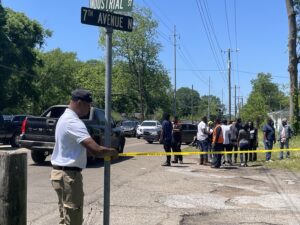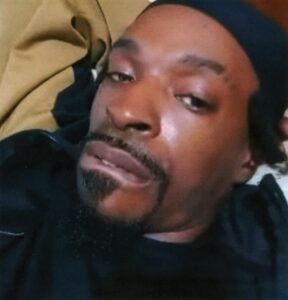
When Reuben Burch and 14 other Mississippi State University faculty members began the university’s Athlete Engineering Team in 2017, they had about $2,500.
Now, they have as many as 90 people across the MSU campus involved in the team’s research into student athletes’ performance, and they’ve been awarded more than $2 million, mostly in grants.
“It’s all the different engineering programs, plus kinesthesiology, plus textiles and fashion design — believe it or not — sociology and psychology,” Burch told the Columbus Rotary Club at its weekly luncheon Tuesday at Lion Hills Center. “So (we’re) pretty well spread across a good bit of campus, and we work with all 19 of our sports teams, mostly through the strength and conditioning coaches and the athletic trainers.”
Together, students and professors in those fields study ways to help athletes perform better. For Burch, an assistant professor in industrial and systems engineering — and a former football player for the Bulldogs — that means studying wearables, small pieces of technology connected to an individual’s body that can capture data on how the body is performing a certain activity.
Ideally, good wearable technology will help reduce injuries and increase athletes’ health, Burch said.
He said he and the Athlete Engineering Team conducted a study in 2018, going around the country to talk to strength training coaches about wearable technology and how it assisted — or in some cases, failed to assist — with athletes’ health and performance.
“There’s only two people on any sports team that interact with every student athlete on every team on a regular basis, and that’s the head coach and the strength coach,” Burch said. “A good team has both of those people working together in unison all the time because a lot of times the head coach may design practice around what the strength coach’s feedback is.”
When they talked to coaches, they found that many of the engineers who designed wearables hadn’t necessarily known firsthand how athletics training programs worked and what data the coaches could use — certainly not as well as the coaches did.
For example, Burch said, when the team interviewed strength coaches, the coaches said they wanted wearables that captured data on what athletes’ feet and ankles were doing during practice.
“It’s because the lower body is what’s called a close-kinetic chain, meaning when my feet are in contact with the ground, there’s only so many ways that biomechanically can move,” Burch said.
“If my ankle is doing (one thing), that means my knee, my hip and my lower back have to be doing these other things. So if you can show me what a person’s ankle is doing, because I’m a multi-degree kinesiologist, I can tell you exactly what’s going on in the rest of the body.
“So all these wearables that I’ve got to stick on my hip or my knee or my upper or lower back? It completely misses the picture because if I don’t know what’s going on beneath it, I’m not going to be able to figure out what’s going on,” he added. “Most wearables, you notice, don’t actually focus on what’s going on in the lowest part of the body.”
They also learned coaches want a “baseline” on how a particular body part of an athlete is doing when that athlete is performing well so they know how to get that athlete back in shape after an injury. For example, Burch said, if a pitcher injures his or her pitching arm, the goal should not be to get that arm back in as good a shape as the other arm — that pitching arm should normally work better than the other arm.
The study resulted in a publication on coaches’ reviews on sports technology in 2019. Since the program began, the team has published more than 40 other academic articles — “academic currency” he said — and currently has about 10 wearable designs currently being considered by the U.S. Patent Office, he told The Dispatch after the meeting.
The team has also begun more community partnerships, even starting a program with student pilots at Columbus Air Force Base earlier this year, Burch said.
Burch said he believes it’s important to stress to students, and particularly student engineers, that they have to work directly with whoever they’re designing their technology for, whether athletes or someone else, because that person will always know what they need better than an engineer who only spends their time behind a computer.
He also wants students to know there are ways to stay involved in sports after college without becoming a coach.
“There are other avenues to stay engaged with sports,” he said. “We’re trying to provide a student pipeline … where we can take students, whether they’re engineers or not, graduate (or) undergraduate, and we can have them be hands-on with sports teams with real people and real customers.”
You can help your community
Quality, in-depth journalism is essential to a healthy community. The Dispatch brings you the most complete reporting and insightful commentary in the Golden Triangle, but we need your help to continue our efforts. In the past week, our reporters have posted 37 articles to cdispatch.com. Please consider subscribing to our website for only $2.30 per week to help support local journalism and our community.







